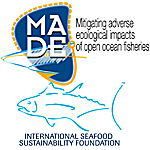Steady increase of the fishing pressure on open ocean fish communities worldwide is evident. However magnitude of human impact on the pelagic elasmobranchs (sharks and rays) is still poorly documented in many oceans. Long-term consistent time-series of quantitative and biological data are rare for the most of species due to lack of research efforts, under-reporting in the fisheries statistics and misidentification. We analysed an unique dataseries (from 1961 to 2011) on elasmobranch catches in the Western Indian Ocean (by species or higher taxa) in the pelagic longlines. Data were collected during ocean-wide research cruises and during onboard scientific observations of commercial longline fisheries. Temporal trends in the elasmobranch abundance and diversity were analysed for spatially stratified subsets: by biogeographic provinces, distance from the coast and vertical habitat. Our results demonstrate a decrease of species richness during observed period. However probable misidentifications during early years of research could distort real pattern. Declines of both nominal catch per unit effort and individual mean weight are also demonstrated for major species. The current status of the Indian Ocean pelagic elasmobranch community, its conservation and knowledge gaps are discussed.
- Presentation

 PDF version
PDF version
